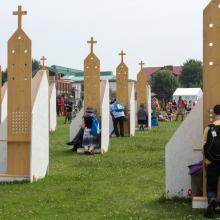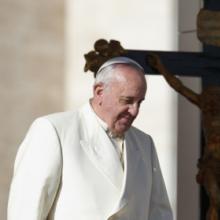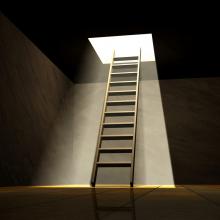Confession

This landscape of “mountains” and “valleys” speckled with glittering stars is actually the edge of a nearby, young, star-forming region called NGC 3324 in the Carina Nebula. Captured in infrared light by NASA’s new James Webb Space Telescope, this image reveals for the first time previously invisible areas of star birth. Photo via NASA/ESA/CSA/STScI
When the biblical writers penned words about the “creator of the heavens and the earth,” they didn’t have the faintest idea of what they were really saying. Yet Christian faith asserts the power that created galaxies full of black holes and dark energy is the same power that became mysteriously embedded in the uterus of a poor teenage girl in a forsaken village in present-day Palestine. The first chapter of the gospel of John describes Jesus’ arrival this way: “All things came into being through him, and without him not one thing came into being” (1:3). That defies all boundaries of rationality.

Image via wjarek/Shutterstock.com
Jesus’ stories always provoke, but they also invite. This story stands as an invitation to be connected in our thanksgiving and especially in our confessing. Let the confessions begin in our homes: in the places we live, with the people we love. Let them continue in our places of worship. Let the confessions be made public such that they might reshape local and national discourse. With confidence, let us confess and receive assurance — even when we turn from God, God is faithful still.

Image via Eric Fahrner/Shutterstock.com
A Louisiana judge has ruled that a state law requiring clergy to report child abuse or other crimes learned in the confessional is unconstitutional because it infringes on religious liberty. At issue is a long-running case involving Rebecca Mayeaux, a 22-year-old who claims that when she was 14 she told the Rev. Jeff Bayhi, a Catholic priest, during confession that a church member was abusing her. Mayeaux claims Bayhi told her to “sweep it under the rug.”

Image via Karl R. Martin/Shutterstock.com
On Dec. 28, just before New Year’s Day, a Cleveland grand jury declined to indict the officers who killed Tamir Rice, a 12-year-old boy who had been playing with a toy gun in a park near his home. For many, the news resounded as yet one more tragic refrain in the long litany of our nation’s utter disregard for Black lives. Extinguished in the innocence of childhood, without even a second thought.

Photo via LoloStock / Shutterstock.com
We’d really like to have an explanation that makes these killers “other” than the rest of us. So we say they are mentally ill and demand our society do a better job caring for them.
While it’s true that we need to do a better job caring for the mentally ill, the vast majority of people with mental illness will never harm anyone. Mass murderers don’t tend to be mentally ill.
“Brace yourself, Father,” I said, taking a seat in a plastic chair facing my would-be confessor in Madison Square Garden’s dimly lit Madison Bar on Friday, a few hours before the start of the papal mass.
The bearded Franciscan priest in his dove gray vestments laughed and said, “No way. It’s all fine. Think of it as a big embrace of forgiveness from your heavenly father.”
OK. I tried to warn you.
“Let me see if I remember how this goes,” I began. “Bless me father for I have sinned; it’s been 35 years since my last confession.”
He tried not to look startled and almost pulled it off.
“Well, I’m glad you’re here,” he said, smiling kindly as he reached beneath his cassock to pull out a small paperback tract that, he explained, contained a list of questions that he could ask me that might make recounting all of my trespasses since the third grade a little less daunting.
LIKE MUCH OF the world, I’ve been thinking quite a bit about ISIS over the past few months. I’ve been horrified by the accounts of the so-called Islamic State’s barbarism, and I lament their perversion of one of the world’s great religions.
Most of all, I’m outraged at their disregard for human life—at their wanton killing of Shia Muslims, Christians, Yazidis, and anyone else who doesn’t share their radical vision. Pope Francis has said that it’s legitimate to act to protect innocent lives in this case, and I don’t disagree with him.
Yet I believe that Jesus calls us to be peacemakers, which requires us to think beyond short-term military solutions and address the systemic issues that breed crises like this one. And I strongly believe that to have any moral authority in the current crisis, we must first confess the Western policies and attitudes that have contributed to where we find ourselves today—and then repent of those policies and attitudes.
The first thing we need to confess is a shallow and, at best, incomplete understanding of ISIS. Alireza Doostdar of the University of Chicago Divinity School wrote, “[We] seem to assume that ISIS ... has suddenly materialized out of the thin ether of an evil doctrine. But ISIS emerged from the fires of war, occupation, killing, torture, and disenfranchisement. It did not need to sell its doctrine to win recruits. It needed above all to prove itself effective against its foes.”
Anglican priests should no longer be bound by the centuries-old principle of confidentiality in confessions when they are told of sexual crimes committed against children, the Church of England’s No. 2 official said.
Speaking at the end of an internal inquiry on whether senior church officials ignored abuse allegations involving children, Archbishop of York John Sentamu said that “what happened was shameful, terrible, bad, bad, bad.”
He said that the Church of England must break the confidentiality of confession in cases where people disclosed the abuse of children. “If someone tells you a child has been abused, the confession doesn’t seem to me a cloak for hiding that business. How can you hear a confession about somebody abusing a child and the matter must be sealed up and you mustn’t talk about it?”
Often we do not know how our words and actions affect and harm others. However, ignorance is not an excuse. As the body of Christ, we must be willing to look deeply at the implications of the choices we make. When those choices cause harm – intentionally or unintentionally – we must repent and ask for forgiveness.
Forgive Us: Confessions of a Compromised Faith was a cry from my heart and the hearts of my coauthors as we wrestled with what it means to be the church of “Good News” in the 21st century. So many people do not see the evangelical church from that perspective. The church – rather than being Good News – is often a painful place where broken people, judgment, and criticisms prevail.
THE NEWS IN mid-May was grim: Scientists announced that melt across the West Antarctic was proceeding much faster than before. In fact, they said that at this point the melt of the six great glaciers fronting Amundsen Bay was “unstoppable,” and that over a number of decades it would raise sea levels by 10 feet or more.
This is another way of saying: Given dominion over the earth, we’ve failed. We’ve taken one after another of the planet’s great physical features and wrecked them. The Arctic? Summer sea ice is reduced by 80 percent, and it’s an every-year affair now to boat through the Northwest Passage, impassably choked by ice until this millennium began. The seven seas? Thirty percent more acidic than they were in the past—and the acidity could double or triple by the end of the century. The Antarctic? It’s not just warming rapidly, but its wind patterns have been changed by the ozone hole in ways that amplify the heating. Storms are stormier, droughts are deeper, fires last longer, rain falls harder.
And all because it was a little easier and a little cheaper not to change off fossil fuels. When scientists sounded the alarm about all this in the late 1980s, the atmospheric concentration of carbon dioxide was about 350 parts per million—or what we now consider the upper bound of safety. If we’d heeded their fervent warnings, we’d have moved with great speed to convert to solar and wind power. We’d have parked our SUVs. We’d have insulated every home in the world. It would have cost money and it would have been inconvenient; on the other hand, it could have bred solidarity in much the same way that preparing for World War II transformed the U.S.
I live in Washington D.C., a city in which mistakes are messaged and shortcomings are spun. True confession and true repentance do not occur — unless it is politically advantageous. Naturally, cynicism runs rampant.
In this environment, though we all know our own weaknesses, grace is rarely offered for failures.
Which is why Lent is such an important season on the Christian calendar. It is an opportunity to pause and reflect, to examine our hearts, and to acknowledge the ways in which we have fallen short. But we don’t confess our failures to a public waiting to crucify us. Instead, we confess our sins to one who loves us and was willing to be crucified in order to reconcile us once and for all.
Lent is rarely talked about as a celebration, but it is an opportunity to revel in the joy of forgiveness.
As part of Pope Francis’ pastoral reforms, all 44 senior members of the Roman Curia, or governing body, must take turns hearing confession at a church near the Vatican.
There is even speculation that Francis himself could hear confessions at the Church of the Santo Spirito in Sassia, just outside the Vatican walls, where his bishops and cardinals have been directed to perform the sacrament of penance and reconciliation.
“I think it’s likely the pope will discreetly hear confessions at some point,” said Giacomo Galeazzi, a veteran Vatican watcher from Italy’s La Stampa newspaper. “The pope has long been an advocate of the pastoral aspects of the ministry and now the Curia will as well.”
DERBY, Conn. — The Rev. Janusz Kukulka can’t say for sure that his parishioners are sinning more, but they sure are lining up at the new confessional booth to tell him about it.
For years, Kukulka, was content with absolving sins in a private room marked by an exit sign to the right of the altar St. Mary the Immaculate Conception Catholic Church.
But something happened during Lent this year. For the first time, Kukulka really noticed the two confessionals missing from the rear of his church. They’d been gone for four decades, ripped out during the 1970s to make room for air conditioning units during a renovation inspired by the Second Vatican Council.
They must have been a thing of beauty, Kukulka thought. He imagined their dark oak paneled doors and arched moldings to match the Gothic architecture of the church designed by renowned 19th-century architect Patrick Keely.
Their absence was striking, especially when the Archdiocese of Hartford had asked parishes to extend their confession hours during Lent, part of a public relations campaign to get Catholics to return to the sacrament of reconciliation.
So, one Sunday Kukulka announced his desire to the congregation. “I told them I wanted a visible confessional,” he said.
He got one within a week.
There’s someone who is new here at House for All … actually they are new to church entirely and therefore unfamiliar with liturgy. After coming to House for a few weeks I met them for lunch and asked what stands out for them at church expecting them to say the singing or maybe the community. “You know that part at the beginning where we all say together that we’ve fractured relationships and done things we shouldn’t and stuff?” Uh…I answered…the confession? “Yeah! they said. That’s so amazing.”
There’s a trend in starting new Lutheran churches to actually eliminate the confession and absolution in the liturgy because, well, it just makes people feel bad. And let’s be honest, it’s just a lot more appealing to go to a church that doesn’t make you feel bad.
And I guess there is some logic to that. I mean, if the point of religion is to teach us good from evil and how to choose the good, then who wants to start out each Sunday saying that you didn’t manage to pull that off. Again.

Sign for the confessional at Lourdes. Via Wiki Commons http://bit.ly/s71Wf2
Everybody needs forgiveness.
But it’s hard to face that. It feels threatening, like an accusation. So we tend to get defensive and start justifying ourselves, rather than seeing the one we’ve hurt.
If we’re honest, though, we all know that we’ve done things that have hurt others. Probably lots of things.
As I have read about the Occupy Movement, I have noticed many individual Christians expressing support, but little public support for the movement from the Christian community as a whole.
I have had mixed feelings about this.
Certainly support of the poor, standing up for social justice, most of what the Occupy Movement is about, coincide with what we are called to as Christian people. Yet I think it would be inappropriate for Christians to try to jump into leadership roles when the Occupy Movement is so diverse and when we have so often failed to take a stand on such issues ourselves.
It seems to me that public confession and repentance might be the best way to communicate our support with appropriate humility.
With this in mind I make the following confession as a person of Christian faith. I hope others will join me in this or similar confessions.
My favorite characters in The Lord of the Rings are the Ents -- an ancient race of giant living, talking, breathing trees in J.R.R. Tolkien's fictional land, Middle Earth. I have a little confession to make: Whenever I hear a reading from Isaiah 55 where it says, "The mountains and hills before you shall burst into song and all the trees of the field shall clap their hands," I always picture the Giant Ents from The Lord of the Rings. And then I picture these clapping trees from Isaiah holding little Hobbits in their branch arms in what ends up a willful conflation of Middle Earth and Major Prophet.








